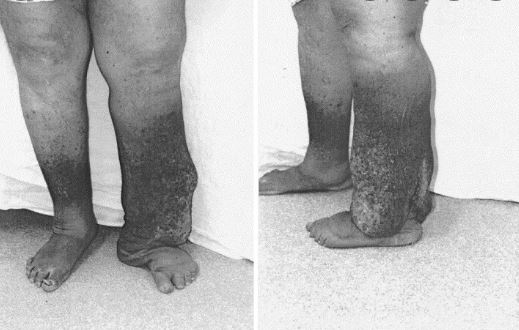Lymphedema refers to tissue swelling caused by an accumulation of protein-rich fluid that’s usually drained through the body’s lymphatic system. It most commonly affects the arms or legs, but can also occur in the chest wall, abdomen, neck and genitals.Lymphedema can be caused by cancer treatments that remove or damage your lymph nodes. Any type of problem that blocks the drainage of lymph fluid can cause lymphedema. Signs and symptoms can range from mild to severe which includes; swelling of part or all of the arm or leg, including fingers or toes, A feeling of heaviness or tightness, Restricted range of motion, Recurring infections, Hardening and thickening of the skin and many more.
Causes
The most common causes of lymphedema include:
Cancer
According to an article by both NHS and MayoClinic published on the 25th November 2019 and 18th of September 2021 respectively, treatment for cancer can involves surgery to remove sections of the lymphatic system. If cancer cells block lymph vessels, lymphedema may result. For instance, a tumor growing near a lymph node or lymph vessel could enlarge enough to block the flow of the lymph fluid. Some of the more common cancers where this happens are: breast cancer, skin cancer, cervical cancer and vulval cancer, prostate cancer or penile cancer.
Obesity
Obesity is another possible cause of secondary lymphoedema. People who are obese, particularly those who are severely obese, have an increased risk of developing swollen body parts. It’s not clear exactly why this is, but it’s been suggested that the extra fatty tissue affects the lymphatic channels in some way, reducing the flow of fluid through them. In these cases, weight loss is an important part of treatment and even just starting to lose weight can make a big difference to the swelling.
Immobility
Movement and exercise help lymph drainage because muscle activity surrounding the lymphatic vessels massages fluid into and along them. Reduced movement can therefore lead to lymphoedema because the fluid in the lymphatic system does not get moved along. For example, people who have limited mobility for a long period of time as a result of an illness, nerve damage or arthritis may be at risk of lymphoedema.
Parasites.
In developing countries in the tropics, the most common cause of lymphedema is infection with threadlike worms that clog the lymph nodes.
When to see a doctor: Make an appointment with your doctor if you notice persistent swelling in your arm or leg. If you’ve already been diagnosed with lymphedema, see your doctor if there is a sudden dramatic increase in the size of the involved limb.



